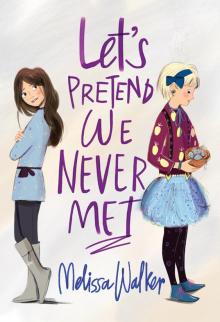- Home
- Melissa Walker
Let's Pretend We Never Met
Let's Pretend We Never Met Read online
Dedication
For Ida Lou, my newest love
Contents
Dedication
Chapter 1
Chapter 2
Chapter 3
Chapter 4
Chapter 5
Chapter 6
Chapter 7
Chapter 8
Chapter 9
Chapter 10
Chapter 11
Chapter 12
Chapter 13
Chapter 14
Chapter 15
Chapter 16
Chapter 17
Chapter 18
Chapter 19
Chapter 20
Chapter 21
Chapter 22
Chapter 23
Chapter 24
Chapter 25
Chapter 26
Chapter 27
Chapter 28
Chapter 29
Acknowledgments
About the Author
Credits
Copyright
About the Publisher
Chapter 1
When Mama and Daddy sat me down to tell me that my grandmother in Philadelphia needed our help, that she was getting older and wanted to see us more, I knew what they were doing.
They were making it so that if I refused to go, if I kicked and screamed like they knew I would, I’d look selfish, like a spoiled eleven-year-old who doesn’t care about her poor, frail grandmother.
The truth is, I love my grandmother (I call her by her first name, Maeve) because she lets me borrow ivory-colored combs for my hair and doesn’t mind when I open up her “traveling trunk” and dig through it to pick out silk scarves to spin around in.
I am an excellent granddaughter.
But leaving in the middle of sixth grade? Not even at the start of a school year? Right before Isabel Jessup’s twelfth birthday party, where she’s going to have a chocolate fountain? This is unfair. Unreasonable. Outrageous.
I argued until I heard Daddy say my full name: “Mathilda Maeve Markham!” And then I knew: that was that.
I wish I had a sibling so we could at least team up. The biggest protest I can think of is riding in the way-wayback of our minivan with my arms crossed over my chest as we drive from North Carolina, which takes like nine hours. That’s nine hours of Mama and Daddy knowing that I’m angry and I don’t want to go.
But after an hour, I fall asleep against the window, and when I wake up I’m hungry and Mama offers to stop at Burger King, so I get a cheeseburger and move to the middle row of seats, because they’re more comfortable for eating. Besides, it was getting lonely in the way-wayback.
“We’re going to be on the top floor of an apartment building,” says Mama. She’s told me this at least ten times, but it’s one of the things I’m sort of excited about. Apartment buildings are fancy.
“Tell me about the door guy again,” I say.
“Doorman,” says Daddy. “There are a few of them, but I met a nice one named Will.”
“And he wears a uniform?” I’ve been told this is the case, but I want to confirm it. It’s another thing I’m sort of excited about. We don’t have uniformed doormen in my town in North Carolina.
“He does indeed. Black with brass buttons.”
I sit back in my seat and look out the window. It might be like having a butler, which I’ve only seen in movies.
As I watch the highway miles go by, the green ground turns white with the frost of December snow up north, and the restaurants change from Hardee’s to Roy Rogers. I wonder what else might be different about this move. Will I be different? Can I?
At my old school, I played it safe. I was in the middle—not the smartest kid or the one with the most friends, but not at the bottom. Maybe this is my chance to move up.
We stop at my grandmother’s house for the night before we go on to our new apartment—the moving van isn’t coming until tomorrow, so we wouldn’t have beds to sleep in yet.
When Maeve’s tall, thin shadow steps into the entryway light, I smile and rush forward for a hug. She smells like Shalimar, a perfume she bought in France. Like travel and romance.
My grandfather died before I was born, so Maeve is alone in this big, old row house in the middle of the city. It’s got three floors and it’s really narrow, and I always thought it would make a great movie-set house because it has polished wood floors and real built-in fireplaces—not to mention a stained-glass bay window in the living room and a creepy old basement covered in dust.
“Your bed’s all ready, Honeypie,” Maeve says. If anyone else called me that I’d probably make a face, but Maeve has nicknames for us all, and she grew up in West Virginia, so her voice is soft and sweet and southern and her Honeypie sounds like whispered love.
When she tucks me in a few minutes later, she brushes the hair off my forehead and says, “It’s hard to move to a new place, isn’t it?”
I nod, but my eyes are half-closed, I’m already drifting away, into the soft, feathery comforter that floats around me like a cloud.
“Don’t worry, Honeypie.” Her voice is soothing. “You’re sweeter than peach cobbler, and prettier than a bluebird.”
I don’t believe her—she’s my grandmother, after all—but I fall asleep smiling anyway. Because when I’m with Maeve, I’m home. For one more night anyway.
Chapter 2
When I start unpacking, it really hits me: I live here now. My purple-painted room with the light-green carpet and the white lace curtains that would never fit these big apartment windows? Gone. Not mine. Some other kid is at my old window, looking out at the dogwood tree and listening to the whippoorwill sing.
That is so weird. I know it’s not very nice of me, but I don’t think I like that new kid.
I wonder if a kid was in this room before me. Maybe they’re even missing it right now, like I’m missing my old room. I haven’t figured out what’s special about this apartment yet, but I’m sure something is. When you live somewhere you find all kinds of reasons to get attached to a place.
In our house in North Carolina, there was a little closet under the stairs that had a slanted ceiling. I had a lamp in there that spun in a circle and lit up the walls with blue stars. When I was younger, it was the perfect place for tea parties, and when I outgrew those it was for secret-telling when my best friends Lily and Josephine came over. I have to find a safe whisper spot in this apartment, once I make some friends.
The view outside my window is not of city lights, which is what I imagined I’d see here. There’s actually another building really close to ours, so although I get some light from above, there’s mainly a brick wall in front of my face when I look outside. Mama frowned when she opened up my blinds and realized that—Daddy found the apartment, so she hadn’t ever seen it—but I told her it made me feel like a city kid, which is cool.
There’s a mirror on one wall that was here when we arrived. It has a dark wood frame and it’s hung right at my height. I give my reflection a once-over and pull out my ponytail, letting my long brown hair fall down to the middle of my back. It’s slightly curly in a way that can either look messy or cute, depending on the weather, and I decide that I’m going to wear it down on the first day of school after winter break. I know that the first time kids see you, they decide things about you, and I want to be a girl with long hair.
I hear Mama’s cell phone ring, and I stay still to listen. Our regular phone isn’t set up yet, and my parents are cave people who won’t get me a cell, so . . .
“Mattie!”
Yes!
Mama brings me the phone. “It’s Lily,” she says.
I squeal and grab it.
“Lils!”
“Mat!”
“Wha
t’s up? Has Ryan texted you yet?”
Lily gave her number to Ryan Grant at a last-day-before-break holiday party, which is pretty much the same as becoming his girlfriend. We think.
“Not yet, but Jo and I think he’ll probably text me either on Christmas Day or the day after, so we can talk about what we got and we won’t have to wonder what to say.”
Her voice is bubbly and excited, but my heart stings when she says Jo and I think because I already feel like they’re forgetting me. I’ve always been closer to Lily than Josephine, like it was the two of us plus Jo . . . but now that’s different.
I act happy, though. No one wants a downer who moved away as a friend.
“That’s so true!” I say. “He probably wants to be sure y’all will have a lot to talk about.”
“Exactly,” says Lily. “And Jo also thinks that he’s going to ask me to a movie. I’ll definitely say yes but haven’t decided if I’m going to let him kiss me or not.”
Whoa. “Kiss you?” I ask, and she must hear the surprise in my voice.
“Yeah!” says Lily. “We’re not babies anymore, Mattie. Jo and I think we should try to get our first kiss this year. We’re almost twelve.”
“Oh,” I say, hesitating. “Good idea.”
Lily laughs. “I forgot that you don’t know anyone yet! Oh, but Mattie, that could be so exciting. New boys!”
“I know,” I say, trying to sound upbeat but not really sure how I feel about all the new in my life.
“Jo and I think that you might really blossom this year,” says Lily, sounding like a doctor or something.
“What does that mean?” I ask.
“I don’t know, just that you’ve always been quiet and stuff,” she says. “Maybe you’ll have more fun at your new school.”
More fun? “I think we have fun,” I say to her.
“We did!” says Lily, and then she corrects herself. “We do! Oh, forget I said that. Maybe I said it wrong. Gah!”
I can almost see her stick her tongue out over the phone. Lily does sometimes say things in a weird way.
“It’s okay,” I say, trying to ignore the heaviness that’s settling into my chest. “Yeah, I’m going to try to make this year a lot of fun.”
Lily tells me that her mom keeps talking about missing my mom because she really wants Mama’s magic bars at the school’s holiday bake sale, and then she has to go because her dad wants her help wrapping presents.
When we hang up, my room feels even more empty. I didn’t realize my best friends thought of me as “the quiet one.” Maybe I don’t say much out loud, but inside I’m full of fun ideas and random thoughts. I thought they knew that. I thought they knew me.
Chapter 3
I frown at the white walls of my bedroom. I’m mostly unpacked and I’m holding my star lamp but I’m not sure it’ll feel right in here. I wish this room had more personality. It’s so . . . blank. I don’t want to be blank, and I don’t want my room to be either.
Maybe they paint everything back-to-boring white when new people move in. I sit down on the floor and scratch my fingernail against the wall behind my bed. It takes some doing, but once I get through a layer of paint, I see that there’s a pale orange underneath the white.
Huh. That’s kind of cool. I don’t know if it’s a boy color or a girl color, but I decide that the kid here before me had style. Or at least a “sense of self,” which my dad always says I have. It’s a good thing, having a sense of self. It means I’m going to paint these walls, or maybe even get wallpaper, very soon.
We’re on the ninth floor, which is the very top of Butler Towers. They aren’t actually that tall, as tall buildings go, but I’ve only lived in a two-story house before, so we seem way high up to me. Our town is outside of Philadelphia, in the suburbs. When Dad first said we were moving here, I pictured Maeve’s neighborhood—which has rows of houses stuck together along a cobblestone street. And then when he said we’d be living in an apartment building, I imagined downtown, with skyscrapers and train stations. This town is not as cool as all that—it’s kind of like my town in North Carolina—but Dad was right about the doormen: they do wear brass buttons. Plus, there’s an elevator. I love the elevator.
“Mattie?”
Mama’s in her room. We will never have to raise our voices in this apartment, because there are just two bedrooms and they’re both right next to the living room, which is right next to the kitchen.
“Mama?”
She walks into the hallway, brushing dusty hands on her jeans. Her nails are short and her dark-red polish is chipped, which is unlike her. She’s usually very put together, but right now she’s doing all the unpacking since Daddy is over at Maeve’s house helping out.
Daddy already has a job—he starts at a law firm on Monday—and Mama’s been looking for work, but so far she hasn’t found anything. I’m not worried, though; I know she will. She ran the bakery at a restaurant in North Carolina, and she always says she’s happiest when she’s baking; she makes the very best cakes and cookies I’ve ever tasted, including the kinds you buy from fancy places. And I don’t think that just because she’s my mama. I mean, Lily’s mom is still talking about the magic bars.
I heard my parents arguing last night. Mama was saying something about Maeve. I know because Mama said, “She’s your mother.” Then today when Daddy left the house, Mama gestured to all the boxes and gave him a look and Daddy said, “Well, you wanted me to talk to her!”
When my parents argue, Mama’s voice gets really high and tight, but Daddy always sounds calm. It makes him seem like he’s winning, so I’ve tried to take note of that and use it in my own arguments. Not that I’ve had many. Still, the low-talking technique is in my back pocket if I need it.
“Want some help in here?” Mama stands in my doorway.
I scoot away from the scratches I made on the wall and make sure my comforter falls into place to cover them.
“Sure.” I start to open one of the three boxes left. It’s marked “Mattie Dresser.”
For the next hour, Mama helps me put my clothes away and reassemble my bookshelf, but when we come to the very last box, a tiny one that has silver duct tape all around the edges, I tell her I want to finish up myself. This is the box that I sealed at the very end, the night before we drove away from North Carolina forever. This box has the Good Stuff.
“Okay, Mattie, my dear,” Mama says, tousling my hair. “I’ll make us a snack.”
I wait until she walks out and then I close the door and sit on the bed with my box. I shut my eyes and think about each of the three things inside.
First, there’s the piece of paper where I played MASH for the last time with Lily and Josephine. MASH is a game where you learn your future, and in this round I got the very best possible outcome: I’m famous and living in a mansion with Josh Jensen and we have two kids and drive a BMW.
Second is a piece of fool’s gold that Daddy and I found in our driveway two summers ago. It’s not your ordinary fool’s gold—it’s a giant chunk with five smooth sides and one rough edge. I saw it glinting in the sunlight and thought someone had dropped a locket or something . . . it’s that big. I wonder if they have fool’s gold in Pennsylvania, but then I remember that I don’t have a driveway anymore, so where would I look for it?
And third: the ring. It’s not a silver ring or something with a sparkly gemstone or anything—it’s much more than that. It’s a piece of twine tied into a bow. Josh Jensen gave it to me at sleepaway camp last summer. I mean, he sort of did. We were in the craft hut during free hour one day, and I was making friendship bracelets while he practiced his sailing knots on the other side of the room. He was completely ignoring me, not even looking up, but then—right when the brass bell called us for dinner—he came over and laid the ring on the table in front of me, saying, “Here.”
It was the greatest thing a boy’s ever said to me.
I didn’t even like Josh Jensen as anything more than a guy from camp, but suddenl
y he became Josh Jensen. The twine stayed tied too, right in a neat bow that fits perfectly on my fourth finger. I wish he knew that I wear it whenever I’m nervous, that it’s going to help me through my first day at a new school after winter break. If my parents would let me get any kind of online account besides plain old email I could show him.
I use scissors to get through the tape. Then I open the box and take out my three treasures. When I look at them plainly, they don’t seem very special—a piece of folded paper, a rock, and some string. But when I line them up on my windowsill overlooking the parking lot, they make the room feel like home, and I’m more at ease.
At least until I hear the banging from next door.
Chapter 4
“I’m Agnes P. Davis,” says the brown-eyed girl with pale skin and boy-short blond hair who opens the door to 914 Butler Towers when Mama and I knock.
We didn’t even have a chance to ask.
“Hi, Agnes,” says Mama. “I’m Mrs. Markham, and this is my daughter, Mattie.”
“You look my age,” Agnes says to me. “I’m eleven years, two months, and four days.”
She stares at me expectantly.
“I’m, uh . . .” I try to do some math in my head, but who can think so fast? “I’m eleven too,” I say.
“You sound like a country singer,” she says to me.
“I’m from North Carolina,” I tell her, nervous that she’ll make fun of me. Lily and Josephine told me that people up north are sometimes mean about accents. They’ll tell you you sound stupid, they said.
But Agnes P. Davis just says, “Cool!” And she grabs my hand. “Let’s play!”
None of my friends at home still play. We hang out, we talk, we do stuff. Before I have time to react, she jerks me inside her apartment. I look back at Mama with wide eyes, but she just smiles and peeks her head in, looking for the parents of Agnes P. Davis.
“Mrs. Davis? Mr. Davis? We heard some banging. . . .” I hear Mama calling as I zoom past a neatly organized living room and into a bedroom of crazy.
The first things I see are the walls. One striped, one polka-dotted, one with stars, and one with tall flowers painted on it. I cannot even list all the colors, but believe me, the rainbow is here. And when this girl said play, she meant it. There are Bratz dolls, Care Bears, and My Little Ponies all over this room. At first it looks chaotic, but when my eyes settle among the bouncing patterns, I see that all of the toys are carefully lined up on shelves and in baskets.

 Lovestruck Summer
Lovestruck Summer Unbreak My Heart
Unbreak My Heart Dust to Dust
Dust to Dust Let's Pretend We Never Met
Let's Pretend We Never Met Small Town Sinners
Small Town Sinners Why Can't I Be You
Why Can't I Be You